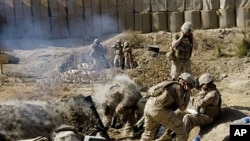It was a difficult decision for the president - three months in the making. But on December 1 he finally announced his plan.
"This review is now complete," said Mr. Obama. "And as Commander-in-Chief, I have determined that it is in our vital national interest to send an additional 30,000 U.S. troops to Afghanistan."
The president said his goal was to "seize the initiative" from the Taliban, and to begin bringing U.S. troops home in 18 months.
That decision set in motion a massive effort to move troops and equipment to Afghanistan, just as the U.S. military is preparing to withdraw more than 60,000 of its troops now in Iraq.
Strategic implications
It is a daunting logistical challenge. But the strategic implications are even more significant.
During a visit to Afghanistan in December, U.S. Defense Secretary Robert Gates said the U.S. troop increase, and at least seven thousand more from other nations, demonstrates "unwavering resolve" to help Afghanistan for the long term.
"The United States and our many friends and allies around the globe are determined to defeat those who stand between you and a peaceful and prosperous future," he said. "Together we will succeed and our partnership will flourish for decades to come."
But the first part of that, defeating the insurgency, will be the most difficult.
"What we would expect to see over the course of 2010, as the forces flow into the theater [of war], is a spike in violence levels and casualty levels as the enemy challenges their entry into theater," said Kim Kagan, founder and director of the Institute for the Study of War.
She says in the coming months U.S., international and Afghan forces need to secure Afghan towns, fight hard-core insurgents and convince Taliban foot soldiers to change their allegiance to the government.
"What we have seen work so well in Iraq, that we need to replicate appropriately in Afghanistan is a counterinsurgency campaign that really makes it possible for the population to support the government, or at the very least to reject the insurgency," said Kagan.
Creating responsive government
And at the same time, she says, U.S. forces must build the Afghan forces and a coordinated international effort must fight corruption and build the capacity of the Afghan government. She believes that type of approach can turn the situation in Afghanistan around.
But not all experts agree. Retired U.S. Army Colonel Andrew Bacevich, now a professor of History and International Relations at Boston University, says creating security and responsive government in Afghanistan may be impossible and is not necessary for U.S. national security.
"I fear that three years from now, he won't have achieved the results that he expected, and he'll be faced with a decision at that point, either to extend the mission and pay even greater costs, on the one hand, or he'll have to acknowledge failure at the cost of having expended several hundred billion dollars and, no doubt, having lost several hundred additional American lives," he said.
The former commander of international forces in southern Afghanistan, Dutch Major General Mart de Kruif, would disagree with that.
"What we did in southern Afghanistan, is that we proved that the concept is right," he said. "If you deploy more forces [as we did] in July and August, then you will see the effect that you expect to see." he said.
The general is referring to progress in parts of southern Afghanistan where President Obama deployed more forces earlier this year.
Will Afghan surge work?
Which view is correct will be determined largely in 2010. The president plans a strategy review next December, and commanders will have to prove to him they are on track to begin withdrawing U.S. troops by his July 2011 deadline. Even surge supporter Kim Kagan acknowledges the outcome is not guaranteed.
"We do have to remember that war is a risky business and there is no assurance any particular force level will guarantee success," she said.
And the experts stress that even if the president's strategy proves itself in 2010, it will take several more years of international military assistance, and more years after that of funding and civilian aid, to fully stabilize Afghanistan.











